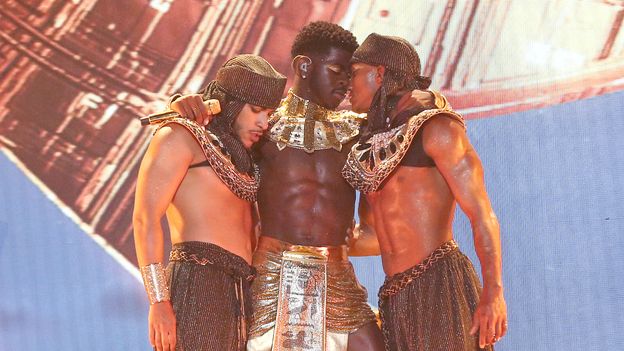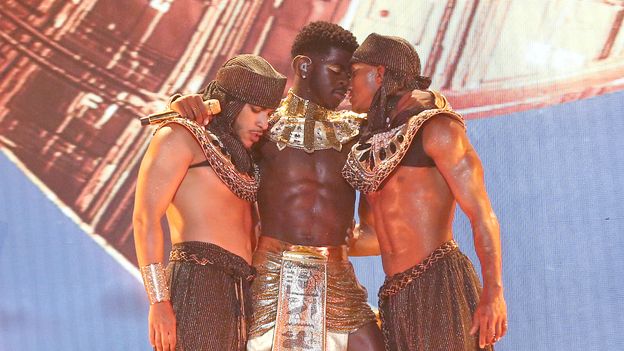
However, Lambert was unapologetic when he was outed in the press, and in the face of outrage at his televised kiss. With this response, he was picking up the proverbial baton passed to him by George Michael, who became very public in his embrace of his sexuality in 1998, after he was outed via his highly publicised arrest for cruising in a Los Angeles public toilet. With the single Outside, he matched sexually upfront lyrics with an irreverent video in which he played a police officer, turning the tabloid attempts to shame him on their head. In the aftermath of the peak of the Aids crisis in the UK, this gave a generation of gay men – who had grown up under homophobic Section 28 legislation – a much-needed shame-free celebratory image of gay sexuality in mainstream culture, and Michael became an exemplar for gay musicians looking to assert themselves.
Why stars have sexed-up
Amelia Abraham, author of We Can Do Better Than This, a new book exploring the future of LGBTQ+ rights globally, says that the new wave of sexually-open queer pop musicians reflects the much wider shift in attitudes towards queer sexuality. But also, it’s gratifying that it’s not just gay men who are dominating such discourse anymore. “Lesbianism and queer femininity have been more invisible, historically, compared to gay male sexuality and I think that is changing, and it’s important to see,” she says. “It reflects a broader shift in society, where more women are comfortable talking about same-sex attraction. We have to thank feminism, LGBTQ+ rights and the people at the forefront of culture who have stuck their heads above the proverbial parapet to improve visibility.”
The contribution of some huge female pop acts in normalising acceptance of queerness can’t be understated, including queer stars like Miley Cyrus and Lady Gaga. Carley thinks Gaga is the most “brightly shining example” of a pop star normalising queer sex over the last decade. “We’re 10 years on from Born This Way, which might not have reinvented the wheel with its sound, but it absolutely helped infiltrate culture in a way that moved the LGBTQ+ message of positivity and acceptance along,” he says. “As more musicians like Gaga come along and follow her through the door she and others before her helped to open, we get closer and closer to mass destigmatising of queerness.”
Social media has also played a role in queering music – and allowing stars to be frank about their lives, when it comes to their sexuality and otherwise, in their own way, unmediated by the industry or the press. In 2012, Frank Ocean changed the landscape of hip-hop forever when he revealed in a Tumblr post that his first love was a man. Without him we probably wouldn’t have Lil Nas X, who originally came to stardom when Old Town Road went viral on TikTok and came out publicly on Twitter in 2019. Troye Sivan started out on YouTube and Cardi B became a viral celebrity on Instagram before she first topped the charts with Bodak Yellow in 2017. These platforms have allowed queer artists to build a following without waiting for record companies to take a risk on them. It also gives them a way of communicating directly with their audience and addressing criticism – or prejudice – head-on.
However, when it comes to commerciality, queer artists have still faced an uphill battle in recent years – and particularly when they sing about sex. In a 2019 piece for GQ magazine, pop-culture writer Alim Kheraj wrote that queer artists were struggling to make money: “the sour truth of it all: queerness still, it seems, isn’t bankable”. Kheraj observed that Hayley Kiyoko was the only openly queer artist to break into the top 40 on the US Billboard Hot 100 chart in 2018 – despite it being a year nicknamed “20GAYTEEN” by Vice Magazine, using an expression coined by Kiyoko herself, for its proliferation of young queer people across popular culture. Sam Smith’s album sales began to fall at the same time as the British singer became more public about their queer sexuality (including with a much-discussed appearance on US talk show Watch What Happens Live). This mirrors what we have seen in Hollywood film, where queer sexuality is still allowed only so long as it is relatively desexualised or not too queer: Call Me By Your Name and Bohemian Rhapsody are just two recent examples of films that starred straight actors and were accused of sanitising their characters’ sexuality for mainstream audiences.








